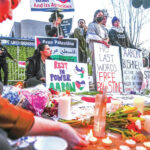US airman’s winding path ended in self-immolation to protest Israel


Dressed in his U.S. Air Force uniform, Aaron Bushnell walked up to the Israeli Embassy in Washington one afternoon this week and calmly described his intention to “engage in an extreme act of protest” against Israel’s military offensive in the Gaza Strip.
He proceeded to pour a flammable liquid over his buzz-cut head, pulled his camouflage cap tightly over his forehead and lit himself on fire. “Free Palestine!” he shouted several times before collapsing onto the cement.
ADVERTISING
In the days since his stunning act, which Bushnell captured on a livestream, friends and relatives have been trying to understand how a young man they once knew as a shy, thoughtful boy in an isolated Christian community in Massachusetts, who went on to become a senior airman working on cyberdefense in Texas, came to mount such a final, fatal protest.
“It’s hard to wrap my head around,” said Ashley Schuman, 26, who has known Bushnell since childhood. “I’m just like, ‘How? How did you get here?’”
Bushnell’s self-immolation has spurred a flurry of vigils in his honor, prompted new protests against Israel’s attacks and led to criticism from some who viewed the protest as a suicidal act that should not be celebrated.
Recent writings from Bushnell, 25, suggest that he had carefully planned his action to focus attention on Israel’s assault on Palestinians in Gaza, where the local health ministry says nearly 30,000 Palestinians have been killed. Israel launched its campaign in October after a Hamas-led attack in which roughly 1,200 Israelis were killed and about 250 more people were taken hostage, according to Israeli authorities.
In the hours before Bushnell’s protest, he sent an email to several independent news outlets with the subject line “Against genocide” that included a link to a website where a video of his self-immolation later appeared. “I ask that you make sure that the footage is preserved and reported on,” he wrote. Bushnell had also sent a will to a friend in recent days, allocating his possessions.
In recent years, according to those who knew him, Bushnell had grown increasingly distant from both his conservative upbringing and his career in the military, throwing himself into leftist and anarchist activism, talking often about alleviating poverty and opposing capitalism. Along the way, he came to reject the small, deeply religious enclave along Cape Cod Bay where he was raised, friends said.
Some former members of the neighborhood, known as the Community of Jesus, have alleged that they were psychologically abused. Bushnell’s family members have not spoken publicly, and a woman who answered the phone at the listed number for the Community of Jesus declined to respond or take a message.
Schuman, who, like Bushnell, was born into the community, said both of them dealt with anxiety in their teenage years from the high expectations and tight restrictions imposed by the community’s leaders and teachers. They attended a communal home-school there, although Bushnell also spent a year at the public high school.
In the summer of 2016, after graduating high school, he visited Israel and the West Bank on a trip led by the Community of Jesus that brought members to historic locations in the Bible, Schuman said. She did not recall any significant discussion of the Israeli-Palestinian conflict during the trip, but said that the students spent a day in the West Bank city of Bethlehem and spoke with several students at Bethlehem University, a Catholic college there.
“I know that trip meant a lot to every single one of us in the group,” she said.
In the years after Schuman and Bushnell graduated high school, they each began to consider whether to remain in the community. The community’s constitution, known as “The Rule of Life,” describes a system of advancement in which adherents can, over several years, reach a status that includes taking a vow of membership “for life.” Instead, Bushnell told Schuman in the fall of 2019 that he would be leaving.
He moved out of the community, where he had lived with his parents and younger brother, and worked at a pawnshop elsewhere in Massachusetts for a brief period before beginning active duty in the Air Force in May 2020, stationed in San Antonio.
Schuman, who had also chosen to leave the community, said they spoke regularly by phone about handling the transition; Bushnell told her that he had been talking to a therapist and urged her to also see one, she said.
Away from work, he seemed increasingly intent on solving the problem of homelessness. Schuman said she grew concerned when Bushnell told her that he had been sending a substantial amount of money to a woman in another state who said she was a homeless mother. Schuman believed the two had never met.
“He didn’t really share very much, other than wanting me to keep her in my prayers,” Schuman recalled. “I was just like, ‘Whoa, Aaron, you don’t even know this person.’ But I think what fueled him was that he was helping somebody else less fortunate than him.”
Into 2021, Bushnell still spoke of possibly returning to the commune on Cape Cod one day, something that was difficult for Schuman to hear as she sought a new life away from it. Eventually, they stopped speaking.
Another friend said that Bushnell complained mildly about his Air Force job — shifting schedules, lack of sleep — and occasionally spoke of his disagreements with the U.S. military over past conflicts, such as the invasions of Iraq and Afghanistan.
In November 2022, fresh off a vacation to Hawaii with his younger brother, Bushnell showed up alone at an event hosted by the Party for Socialism and Liberation in San Antonio, where he quickly made a new group of friends.
Lupe Barboza, 32, said she and her friends invited him to join their mutual aid group’s weekly visits to homeless encampments. She said Bushnell told her group, known as San Antonio Collective Care, that his political views had shifted drastically not long after joining the military.
“He said that he kind of went from one extreme — the conservative beliefs that he had grown up around — to the opposite, forming his anarchist, anti-imperialist values,” Barboza said. “And he said it was a very quick shift, and he just said it went from one extreme to the other.”
But soon after, he announced that he needed to take a step back from the group because he was dealing with some trauma from his past that had resurfaced, Barboza said. Still, he kept in touch with many of his friends in the group.
He told them he was looking forward to leaving the military when his enlistment was up in the spring of this year, Barboza said. On his LinkedIn profile, he wrote that he was “truly passionate about writing software and can’t wait to help drive innovation in the civilian world.”
Susan Wilkins, 59, who also lived in the Community of Jesus from 1970 to 2005 before abandoning it, said she was not close with Bushnell and his family but knew them and worried that he might not have had adequate support to transition into a less-structured world.
“I can see that if you’ve grown up in a somewhat restrictive environment, anarchy has attractions,” she said.
Schuman, like other former community members, has struggled to understand Bushnell’s fatal protest.
“The extreme measures, I will never be able to get behind that,” she said. “But from where we grew up, and having no say in what we really wanted or believed in, it is admirable what he did for people who don’t have a voice right now.”
© 2024 The New York Times Company






